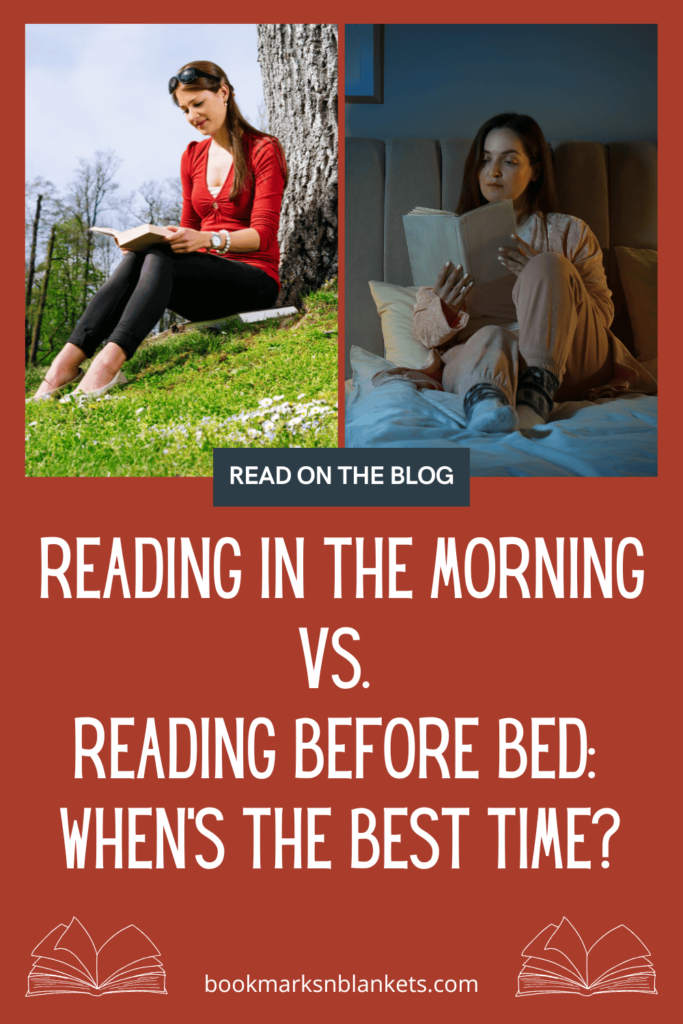For book lovers, the question isn’t if they should read, but when. Some people swear by starting their day with a good book, while others find comfort in ending their night with a few chapters. But is one time better than the other? The answer depends on personal preference, lifestyle, and reading goals.
Let’s dive into the benefits and drawbacks of reading in the morning versus before bed to help you determine the best time for you.
The Benefits of Reading in the Morning
If you’re an early riser or want to establish a new morning routine, reading at the start of your day can set a positive tone. Here’s why:
1. Boosts Mental Clarity and Focus
- Your brain is fresh and well-rested in the morning, making it easier to absorb and retain information.
- Reading non-fiction or self-improvement books early can provide motivation and inspiration for the day ahead.
2. Sets a Calm and Intentional Tone
- Instead of rushing into emails or social media, reading can help you start your day mindfully.
- A quiet morning with a book can reduce stress before the daily hustle begins.
3. Enhances Productivity
- Many successful people incorporate reading into their morning routines to stimulate creativity and problem-solving skills.
- Engaging with complex ideas early on can prime your brain for critical thinking throughout the day.
4. Fewer Distractions
- Mornings often offer a quiet environment, especially if you wake up before the rest of the household.
- Unlike evenings, where screens and social activities compete for attention, mornings can be distraction-free.
Possible Downsides of Morning Reading
- If you have a busy schedule, finding time in the morning may feel rushed or impractical.
- Some people struggle with focus early in the day and may not retain information as well.
The Benefits of Reading Before Bed
For many, reading before sleep is a cherished ritual. It’s a chance to unwind and transition from the chaos of the day to restful sleep. Here’s why nighttime reading has its own advantages:
1. Helps You Unwind and Destress
- Reading fiction, poetry, or light-hearted books can provide an escape from daily stress.
- It offers a moment of quiet before bedtime, helping you transition into relaxation mode.
2. Improves Sleep Quality
- A regular reading habit before bed signals to your brain that it’s time to wind down.
- Studies suggest that reading a physical book (not on a screen) can promote better sleep by reducing stress and anxiety.
3. Creates a Healthy Nighttime Routine
- Instead of scrolling on your phone or watching TV, reading a physical book is a screen-free way to end the day.
- Less blue light exposure means better melatonin production and improved sleep.
4. Encourages Consistency
- Many people find it easier to stick to a bedtime reading routine compared to morning reading, as there are fewer time constraints.
- Reading at night can become a beloved habit that signals the end of the day.
Possible Downsides of Nighttime Reading
- If you tend to fall asleep quickly, you might only get through a few pages before dozing off.
- Reading something too engaging or intense (like a thriller) might keep you awake longer than intended.
- Dim lighting at night can strain your eyes if you don’t have a proper reading setup.
Factors to Consider When Choosing Your Reading Time
If you’re unsure whether morning or evening reading works best for you, consider these factors:
1. Your Energy Levels
- If you feel sharpest in the morning, use that time for deep, thought-provoking books.
- If you struggle to focus early on but enjoy unwinding at night, bedtime reading may be better.
2. Your Daily Schedule
- Morning readers need to carve out time before work or school, which might require waking up earlier.
- Nighttime readers need to set a stopping point so they don’t sacrifice sleep.
3. Your Reading Goals
- If you want to retain information from non-fiction, the morning might be ideal.
- If you read for pleasure and relaxation, nighttime reading may be more enjoyable.
4. Your Environment
- Do you have a peaceful morning setting, or is it chaotic with kids, pets, or work tasks?
- Is your nighttime space comfortable for reading, or do you often fall asleep too quickly?
Can You Do Both?
Absolutely! There’s no rule that says you must pick only one time. Many avid readers split their reading sessions between morning and night:
- Morning: Read educational, self-improvement, or news-related content to start the day with knowledge.
- Evening: Read fiction or lighter materials to relax before bed.
This balanced approach allows you to enjoy the best of both worlds without feeling restricted.
Final Thoughts: What’s the Best Time for You?
Ultimately, the best time to read is when it fits naturally into your lifestyle and helps you achieve your reading goals. Whether you prefer the mental clarity of morning reading or the soothing ritual of bedtime books, what matters most is that you’re making time to read at all.
If you’re unsure, experiment with both! Try reading in the morning for a week, then switch to nighttime reading and compare how you feel. Whichever time you choose, the simple act of reading consistently will enrich your life, one page at a time.
PIN FOR LATER







